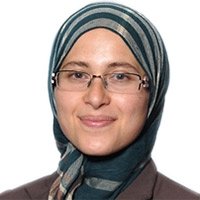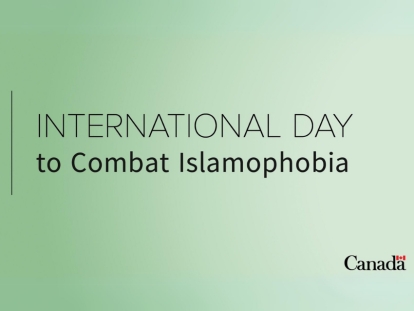Nov
Nov
Former ML writer talks about covering the Arab Spring
Written by Amira ElghawabyWire service ”“ n. A news-gathering organization that distributes syndicated copy electronically, as by teletype or the Internet, usually to subscribers.
Also known as a wire agency.
About a decade ago, Hadeel Al-Shalchi, 32, was writing articles about Ottawa's Muslim community in these very pages. She also hosted a weekly show on Carleton University's student radio station, CKCU, and was a regular guest on CBC Radio, commenting on the latest developments in her homeland.
Obviously, journalism was in her blood, though at the time she was pursuing an engineering degree because her father thought it was a more reliable choice.
Perhaps. But thankfully Ms. Al-Shalchi decided to follow her dreams. After obtaining a Master in Journalism from Carleton University, the then 25-year-old Ms. Al-Shalchi made her way to the Middle East, where her family is originally from, to break into journalism on familiar soil. That decision would change her life and bring her to the front lines of the Arab Spring, including the latest violent uprising in Syria.
Ms. Al-Shalchi, who is now covering the Middle East for the wire agency Reuters, was in Ottawa recently and shared her experiences with a packed room of journalism students, family, friends and members of the wider public. Here are some of her reflections on covering the historic Arab Spring uprisings:
On Tunisia:
It was a really nice revolution to cover. A very civilized revolution. You could cover the protests, and then go take an espresso break.
It was also eye-opening because it was the first time that groups of people were standing around debating democracy, politics, being religious ”“ the future of their own country; this had been unheard of before, people would disappear if you had previously said anything pro-opposition.
Graffiti captured the feeling of the people: “No fear after today”. That foreshadowed all the revolutions”.essentially, there had been a barrier of fear that, once broken through, meant the people felt suddenly that anything was possible.
People in Tunisia are extremely educated and very intellectual so there was a different tone than in other revolutions. Even people living in the rural areas could debate democracy and speak fluently in English and French.
On Cairo:
No one thought anything would actually happen in Egypt on January 25, 2011. I had wanted to stay in Tunis but my editor (at Associated Press at the time) sent me back to Cairo.
January 25th everything happened, escalating on January 28th.
I smelled like a salad all the time. Because of all the tear gas, we had a mix of lemon, vinegar and onions soaking in our backpacks. As soon as you heard the “pop!” of the canister, you put a damp scarf with that mix on your face. It was the only way to survive. It was really bad.
On Tahrir Square:
By January 28, people were being gassed, beat up, and there was a cat and mouse game happening between the people and state security. People were now sleeping in Tahrir Square, refusing to sleep and spent 18 days in a famous square called “Talat Harb”.
The people who were taking part were not the people from the slums ”“ as had been previously predicted would set off revolutions ”“ but we saw the middle class, religious, intellectuals, oppressed. They were opposing the fact that the system made it impossible to live if you didn't have the right position in society. It was an intellectual revolution.
[But] Egypt was hilarious. Egyptians are a funny people, and some were holding up signs that read things like,” Would you leave already, my arms are hurting.” One guy was walking around with a frying pan on his head.
On Libya:
Libya was crazy.
People were well-armed and passionate. They were much more self-righteous than the comedy of Egypt where people could laugh at themselves.
After both Tunisia and Egypt, Libya proved to be a whole other ballgame. I had to learn a lot about what it meant to tell a story of a war. Had to talk about weapons, army positions, rebel brigades.
Nineteen-hour boat rides from Misrata to Benghazi.
On Bahrain:
Bahrain was sad. It started out optimistically. But it would up being dubbed, “the Revolution that never was”. People had protested in a place called Pearl Square, soon, though, by the time the army had gone through, people had deserted it. The police had completely destroyed it. Tanks had completely finished everything off.
The government had had a policy to bring in people from Pakistan and India, give them Bahraini citizenship in order to outnumber the Shia.
On hospitals:
In Libya, field hospitals were very accessible, though they didn't want to be filmed. But in Syria, field hospitals are targeted by army snipers, but there aren't any alternatives because doctors working in regular hospitals won't even treat patients of the revolution. They would turn them into security.
On Syria:
Entered Syria on August 5, left at the end of the month. [The only reporter inside Aleppo at one point].
We did not laugh once in Syria. It was a very harrowing experience. The most difficult pictures I've ever seen, but probably the best stories of my career.
I was smuggled from Turkey into rural Aleppo. I didn't know the story at all, had to learn everything overnight.
Critical to describe how people are fighting. Typical guerrilla warfare, alleyways full of army snipers.
In order to get around, one had to move through people's homes. I was with a tea smuggler, a mechanic and a baker and I had to trust them to get me around.
To get to the Front Line, I'd have to go with a man named Abu Ahmed, and we'd move through where there were giant holes in the walls.
On the personal toll:
Covering Cairo was hard. They were 12-14 hour days and I lived there so that meant I wasn't staying in a hotel but my home”there were bills to be paid, etc., and that added to the stress.
Conflict reporters spend a lot of time hanging around hospitals. We are at the x-ray machines, looking at bullet holes. Doctors have in fact become the spokespersons for revolutions, especially in Libya and Syria. It is very harrowing; a lot of time is spent counting bodies. A lot of time is spent in mortuaries.
[A wire reporter] has to be very accurate, and very detailed. Wire reporters have to cover the numbers. A big part of my job is to look for new bodies, count them, find them, find out what happened to them.
But it is nice to know that our news gets read, by even the White House. We heard that President Barack Obama had read an article I wrote on Benghazi. This is what they depend on in some part to make decisions.
There are scary moments as well ”“ in Libya someone posted a picture of me on Facebook and there was an angry mob looking for me, working for the late Moammar Ghadafi. But I didn't tweet while I was Allepo because [of safety concerns].
After Syria, I was offered PTSD (post-traumatic stress disorder) counseling, and I was indeed exhausted after 17 days in Aleppo.
When I come [to visit friends and family] to Ottawa, I often get angry because people are so oblivious of what's happening. That babies are being taken out of rubble.
On being a woman:
You have to be careful how you manoeuver. These fighters are real dudes. . . not afraid to die, high on testerone and adrenaline and I'm this woman in a ponytail.
On post-revolutionary spirit:
The honeymoon is over. Some people are still proud, but in places like Egypt, there are those that felt the revolution was hijacked by one group or another. Others who want thing to go back the way they were.
But revolution is a process and a journey. Things will not transform with just one leader stepping down.
It's now patience vs. perseverance, Islamists versus Liberals.
Though in the short term, it's amazing though to see people who had been sentenced to life in prison by the old regime for political reasons are able to walk and organize freely.
Hadeel Al-Shalchi has returned to her current posting in Benghazi, Libya. Follow her on Twitter at @hadeelalsh
This article was produced exclusively for Muslim Link and should not be copied without prior permission from the site. For permission, please write to info@muslimlink.ca.

Amira Elghawaby
Amira Elghawaby is Muslim Link’s Editorial Advisor. She is providing professional guidance and training to the Muslim Link team and writers. Amira is also developing relevant newspaper and website policies and a style guide. Amira obtained a degree in Journalism and Law from Carleton University in 2001. Since then, she has worked as both a full-time and freelance journalist and editor, writing and producing stories for a variety of media including the Globe and Mail, the Toronto Star, CBC-Radio, Rabble and the Middle East Times. She is the History Editor for New Canadian Media. Find her on Twitter @AmiraElghawaby.
Latest from Amira Elghawaby
-
 Canada's Special Representative on Combatting Islamophobia Sends Letter to College and University Presidents As School Year Begins
Canada's Special Representative on Combatting Islamophobia Sends Letter to College and University Presidents As School Year Begins
-
 Statement from the Special Representative on Combatting Islamophobia on the Third Anniversary of the London Family Attack
Statement from the Special Representative on Combatting Islamophobia on the Third Anniversary of the London Family Attack
-
 Statement by Minister Khera and Special Representative Elghawaby on the International Day to Combat Islamophobia
Statement by Minister Khera and Special Representative Elghawaby on the International Day to Combat Islamophobia









